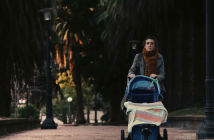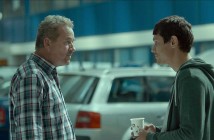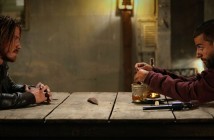
Editor’s Note: 13 Hours: The Secret Soldiers of Benghazi opens in wide theatrical release today, January 15, 2016.
As a result of Michael Bay’s reputation, if the world expected something out of 13 Hours: The Secret Soldiers of Benghazi, it was tone deaf jingoistic carnage making dumb action setpieces out of a tragedy. And it’s hard to blame the world, because after all, it’s equally hard to believe that the man who helmed Pearl Harbor and the Transformers franchise could bring us a war film with smarts on any level. A war film that doesn’t disregard the importance of diplomatic relations and foreign policy, in this case, a war film that exploits neither Libya nor the soldiers it follows, remains realistic, and doesn’t look to induce entertainment in areas where what’s occurring is tragic. Imagine the world’s surprise when it sees that, more or less, that’s precisely what we get.
It’s not a perfect film, by any means, but it’s sophisticated and aware enough to let us know it has the right intentions.
 13 Hours is not an aggressively dumb action spectacle (in other words, it’s not the third act of Transformers: Dark of the Moon), it’s an empathetic and tragic picture. It’s a portrait of fear, of non-xenophobic paranoia, of the shifting battle between wanting to do the right thing and not doing the wrong thing in the process. Take, for example, a scene after the initial attack in which a car full of soldiers is attempting to drive from one compound to the other, and takes a wrong turn, coming across a crowd of Libyans who stop their car. They’re making hand signals to the soldiers, motioning for them to move their car out of the road. The soldiers, flustered after what they’ve just driven from, take the time to decide whether this crowd wants to hide them or ambush them. Then, only when the crowd unmistakably aims their weapons at the car do these soldiers hit the gas and retaliate to any extent. The world expected scenes like this to be painted with hyper-patriotism, dialogue like “Are these assholes with us?” instead of “He’s tapping his chest, is he saying he’s friendly?” The Libyan citizens are shown this level of respect, and what’s more, some are depicted joining the soldiers to fight the militias. It’s not a perfect film in this regard, though, by any means, but it’s sophisticated and aware enough to let us know it has the right intentions.
13 Hours is not an aggressively dumb action spectacle (in other words, it’s not the third act of Transformers: Dark of the Moon), it’s an empathetic and tragic picture. It’s a portrait of fear, of non-xenophobic paranoia, of the shifting battle between wanting to do the right thing and not doing the wrong thing in the process. Take, for example, a scene after the initial attack in which a car full of soldiers is attempting to drive from one compound to the other, and takes a wrong turn, coming across a crowd of Libyans who stop their car. They’re making hand signals to the soldiers, motioning for them to move their car out of the road. The soldiers, flustered after what they’ve just driven from, take the time to decide whether this crowd wants to hide them or ambush them. Then, only when the crowd unmistakably aims their weapons at the car do these soldiers hit the gas and retaliate to any extent. The world expected scenes like this to be painted with hyper-patriotism, dialogue like “Are these assholes with us?” instead of “He’s tapping his chest, is he saying he’s friendly?” The Libyan citizens are shown this level of respect, and what’s more, some are depicted joining the soldiers to fight the militias. It’s not a perfect film in this regard, though, by any means, but it’s sophisticated and aware enough to let us know it has the right intentions.
In another scene, while soldiers defend one of the compounds atop its roof, a lone car drives up and stops at the gate. While all of the other soldiers are asking questions, one soldier, obviously shaken, keeps his sights trained on the car, whispering to himself “I just want to shoot him in the face.” This moment is painted in pain, we see him hating himself for thinking this, trying to find some mindset that will keep him from losing his mind. This struggle between the right thing and the wrong thing even extends past the soldiers, to the unarmed CIA personnel who are also in the thick of this crisis. For example, the chief of the CIA’s compound (David Costabile) who, with much reluctance, prohibits the titular soldiers from leaving to assist the ambassador’s compound. Later on, he makes far bigger decisions, eventually planning the eventual nonviolent evacuation of the CIA compound his team resides in. He, and those around him, are given substantial arcs.
Cinematographer Dion Beebe gives us some fantastic visuals, providing a distinct personality to the aforementioned chaos that lets it transcend above meaningless gunfire, but not into overblown action.
In that, the film’s not stating “Only if you take an enemy life are you a hero,” it’s stating, “If you do what’s right, in any capacity, you are brave.” Even a Libyan on their team has a full arc, letting that statement shine through. And after all’s said and done, watching innocent Libyan citizens mourning their dead, you can feel the mutual mortification at such unnecessary chaos. On top of all of that, cinematographer Dion Beebe gives us some fantastic visuals, providing a distinct personality to the aforementioned chaos that lets it transcend above meaningless gunfire, but not into overblown action. Lorne Balfe’s score lends to every scene it’s in, especially bolstering emotional scenes between the soldiers themselves. As for them, they all give vulnerable performances, letting fear shine through their tough guy facades brilliantly. John Krasinski and James Badge Dale are the leads, and the best examples of this.
All in all, 13 Hours is a shockingly mature effort from Michael Bay. However, word is he’s going back to the Transformers franchise after this. But hey, maybe he’ll bring some of that newly minted maturity with him? Maybe he won’t. Either way, what we have from him now is a pretty admirable effort, and deserves praise simply for being that.
An admirable and mature effort from Michael Bay, 13 Hours: The Secret Soldiers of Benghazi stumbles at times, but always has the right intentions.



